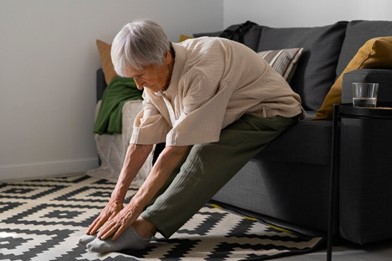As we age, our bodies undergo natural changes that can affect our balance and coordination. This, coupled with potential vision decline and weakening muscles, can increase the risk of falls. Fortunately, maintaining good posture and taking steps to address postural issues can significantly reduce fall risk and enhance your overall well-being.
Understanding Posture and Its Impact on Seniors
Posture refers to the way you hold your body when standing, sitting, or lying down. Good posture aligns your bones and muscles properly, allowing for optimal balance, efficient movement, and reduced strain on your joints. Poor posture, on the other hand, can lead to:
Muscle imbalances: Certain muscle groups become overworked while others become weak, compromising balance and stability.
Joint pain: Misaligned joints experience undue stress, leading to pain and stiffness in the neck, back, and knees.
Reduced flexibility: A hunched posture can restrict your range of motion, making everyday activities more challenging.
Increased risk of falls: Poor balance and coordination associated with poor posture contribute significantly to fall risk in seniors.
Common Postural Challenges in Older Adults
Several factors can contribute to postural problems in older adults:
Osteoporosis: This condition weakens bones, leading to a stooped posture as the spine curves to compensate.
Arthritis: Joint pain caused by arthritis can limit movement and encourage a hunched posture to minimize discomfort.
Muscle weakness: Loss of muscle mass can affect core strength, essential for maintaining good posture and balance.
Vision problems: Decreased visual acuity can make it difficult to navigate surroundings and maintain balance.
Strategies for Maintaining Good Posture
The good news is that you can improve your posture and reduce fall risk at any age. Here are some tips:
Exercise Regularly: Regular physical activity strengthens core muscles that support proper posture and improve balance. Focus on exercises that target core strength, flexibility, and balance.
Maintain a Healthy Weight: Excess weight can put additional strain on your joints and contribute to postural imbalances.
Mind Your Body Awareness: Practice standing tall with your shoulders back and down, keeping your ears in line with your shoulders and your core engaged.
Ergonomics Matter: Use ergonomic chairs with good back support while sitting. Ensure proper desk and computer monitor heights to avoid slouching.
Stretching and Yoga: Regular stretching exercises can improve flexibility and reduce muscle stiffness, allowing you to maintain a better posture. Yoga poses can also be beneficial in promoting balance and core strength.
Assistive Devices: Consider using a cane or walker for additional support if needed. Ensure proper fitting to avoid gait imbalances.
Seek Professional Help if Needed
If you are experiencing persistent back pain, difficulty maintaining good posture, or have concerns about your balance, consult your doctor or a physical therapist. They can assess your posture, identify any underlying problems, and develop a personalized exercise program to improve your strength, flexibility, and balance.
Additional Tips for Fall Prevention
Regular Vision Checkups: Ensure you have up-to-date prescriptions for eyeglasses to maintain good vision.
Home Safety Modifications: Install grab bars in the bathroom, improve lighting in hallways and stairwells, and remove tripping hazards like loose rugs.
Wear Appropriate Footwear: Choose shoes with good traction and proper support to prevent slipping or stumbling.
Hydration and Medication Management: Dehydration and certain medications can affect balance. Stay hydrated and discuss any concerns about medications with your doctor.
Remember, good posture isn't just about how you look; it plays a vital role in your overall health and well-being as you age.


